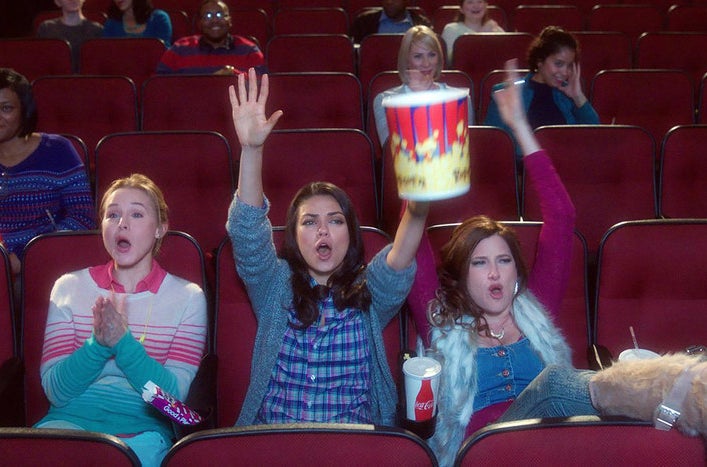

This summer has already flung a few women-behaving-badly comedies at us — like Neighbors 2: Sorority Rising, in which a Chloë Grace Moretz–led sorority set out to prove that getting wrecked and getting wild was something that could be done on female-driven terms. Or Mike and Dave Need Wedding Dates, which, despite being based on a Craigslist ad and being marketed as if watching it could give you chlamydia, was a pretty funny movie about party guys who get tricked into taking even harder-partying girls with them to their sister’s nuptials in Hawaii. In both, female characters played with and then rejected nice-girl stereotypes to outdo dudes at their own game.
When women get to be the focus of R-rated comedies, their stories tend to default to how they’re better at being bros than the bros are, as if misbehavior were a fundamentally masculine endeavor. Which makes the double feature of Bad Moms, the new movie starring Mila Kunis, Kristen Bell, and Kathryn Hahn, and Absolutely Fabulous: The Movie, the big-screen revisiting of Joanna Lumley and Jennifer Saunders’ beloved British TV show, so refreshing. When these characters act out, it has nothing to do with keeping up with men.
Bad Moms features a trio of Chicago-area women: Amy (Kunis), the mom whose marriage is ending, Kiki (Bell), the stay-at-home mom, and Carla (Hahn), the single mom. They indulge in such questionably transgressive acts as playing hooky from work to treat themselves to movie matinees and drinks at a bar. They dare to bring store-bought goods to the school bake sale. One of them sleeps with a man who’s not her husband, but it’s only after said husband cheated on her and they’ve separated. (Plus, the new guy’s a hunky, smitten widower and fellow parent who’s absolutely second marriage material.) When the ladies throw a rager, downing jello shots and bouncing along to David Guetta, it’s over by the school-night-friendly hour of 11 p.m. Even when they’re cutting loose, these women skew way more Goodnight Moon than Keith Moon.
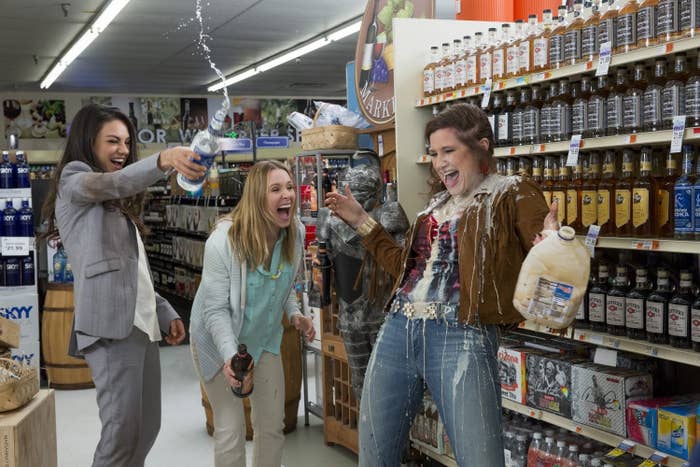
Of all the movies to follow the Bad formula — a collection that includes Bad Grandpa, Bad Teacher, Bad Santa, and that has somehow retroactively enveloped Abel Ferrara’s not-like-the-others 1992 Bad Lieutenant — Bad Moms clearly features the lowest standards for what constitutes misbehavior. But then the point of these Bad movies is that their characters refuse to abide by the expectations of the so-called “good” roles in which they’ve ended up. They’re sexual when they’re supposed to be straitlaced, selfish when they’re supposed to be nurturing, unreliable when they’re supposed to be responsible. They put their own impulses first, until the redemptive ending. Inevitably, they’re put in charge of children, because there are so many rules about how kids ought to be treated that can be trampled for comedic effect. A dirtbag is not inherently funny, but a dirtbag in a Santa costume working the mall circuit is; he’s defacing the idea of the perpetually jolly holiday icon and the image that even a seasonal worker getting paid by the hour is presumed to abide by. It’s the contrast that’s key.
And it doesn’t take much to create a contrast between the ideal and the messy reality for the characters in Bad Moms, a suburban, largely middle-class and white bunch (though Jada Pinkett Smith does show up as a tightly wound PTA henchwoman). They aspire to a perfection that’s impossible to maintain, but that they assume other women are able to manage without visible struggle. Amy sobs in her car over her perceived parental inadequacies between working a part-time job, doing her son’s homework for him, and chauffeuring her daughter to soccer practice. Kiki emerges from isolated days spent caring for four children blinking as dazedly as a miner rescued from a tunnel collapse, until her husband sends her back, sternly reminding her that child care is her job.
Meanwhile, Carla hits on dads, makes out with moms, regards her overgrown son with “I gave birth to that?” bemusement, and needs no lessons in self-care. She is legendary in animal print, furry boots, and a side part so deep it’s more of a comb-over, and when she pays for groceries by making it rain on a bored checkout clerk, it’s a moment of delirious joy. But it’s not her freedom, or any of Bad Moms’ admittedly mild hijinks, that sets it apart from the competition. It’s the way that the movie presents insubordination on terms that aren’t inherently male.
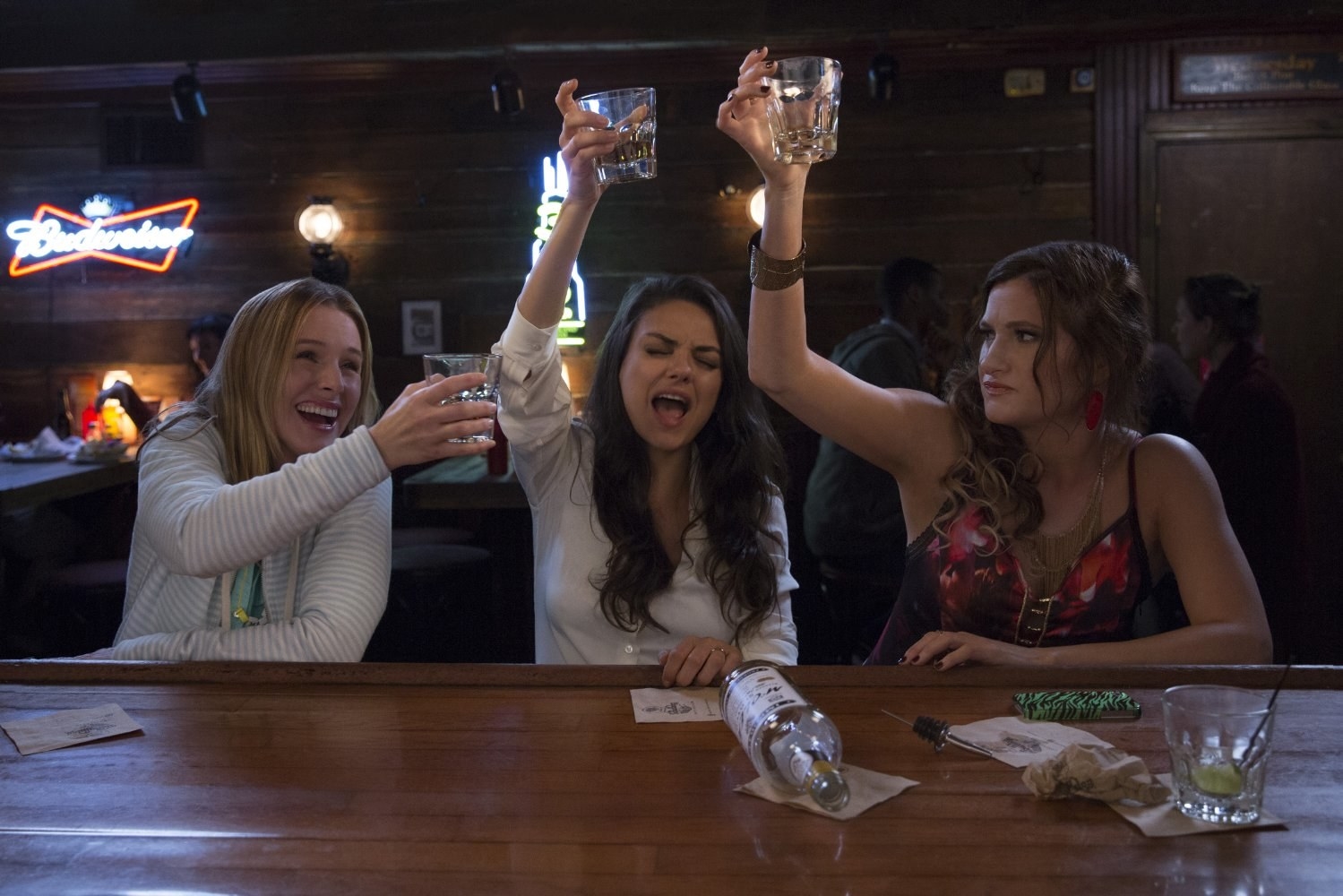
The other Bads stole, schemed, humped vending machines, and engaged in glorious instances of giving absolutely zero fucks to earn their statuses, but to become a “bad mom,” a label Amy, Kiki, and Carla claim for themselves, the only requirement is to not surrender yourself entirely to the needs of your family.
During its big finish, Bad Moms — which is the work of The Hangover writers Jon Lucas and Scott Moore — delivers a pabulum-y message about how hard it is to be a mom these days and about finding more time to let college-prep-stressed kids be kids. But in practice, it’s a movie with a subversive skepticism about traditional white picket fence domesticity in general. It stops just short of leaving all of its main characters happily single, though the downtrodden Kiki’s verging-on-abusive marriage grows in ways that are more about a coup on her part than resolving misery. And Carla's been happy being unattached from the beginning.
In connecting all the duties Amy’s been shouldering at home with how her job demands full-time hours for part-time pay, the movie highlights how work-life balance often doesn’t take into account how much of the “life” part is also work. Being a mother comes with all sorts of labor she’s been expected to want to do, and she’s been doing so well that it’s become invisible, unappreciated, and undervalued. Maternal perfection isn’t just impossible to attain, it’s a trap that keeps these women feeling like they aren’t giving enough, a mirage of effortlessness no one can reach — a realization that is its own form of rebellion. If taking the time to have a leisurely breakfast alone is enough to make someone a bad mom, how can anyone manage to be a good one?
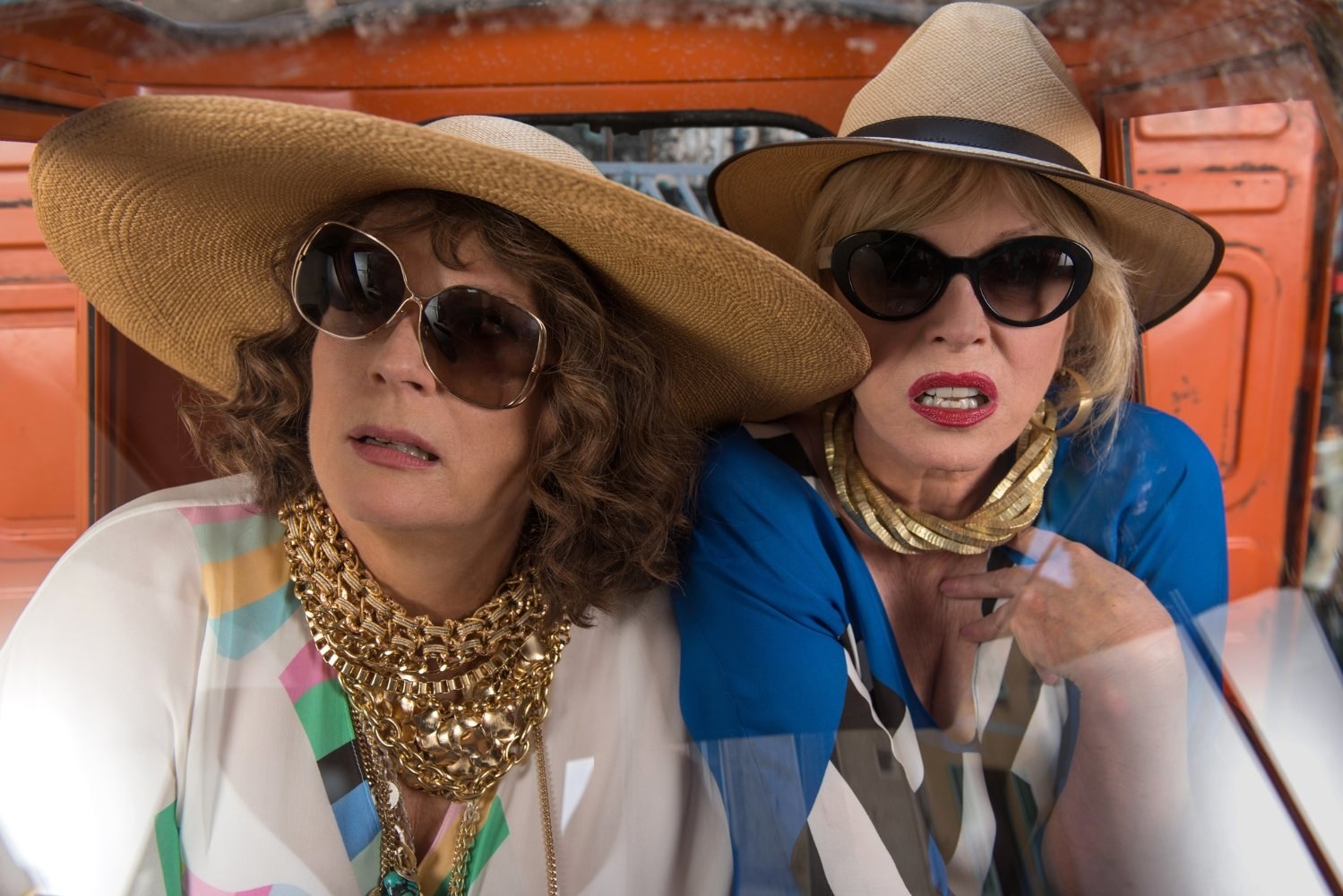
"Me time" has never been a problem for fashion editor Patsy Stone and PR maven Edina Monsoon, the OGs of bad behavior who’ve been played for nearly a quarter century now by Joanna Lumley and Jennifer Saunders. They're just staggering onto the big screen for Absolutely Fabulous: The Movie, and despite the title, the 90 minutes that unfold are barely a movie — they’re just an excuse to send the two friends to the south of France on the lam after maybe accidentally being responsible for killing Kate Moss at a party. Characters from the TV show pop up for brief appearances alongside celebrity cameos in what is, honestly, not a very good film, especially in its recurring, clunky jokes about gender transitioning and fluidity.
But goddamn, it is good to see Patsy and Edina again, falling drunkenly out of cars and hitting on waiters and spending outrageous amounts of money on ghastly fashions. They're still going hard after all these years. And though they’re not immune to time — no matter how many syringes they plunge in their faces in the morning — they seem to be immune to most other forms of guilt and shame, the ones that plague Kunis's Amy and Bell's Kiki.
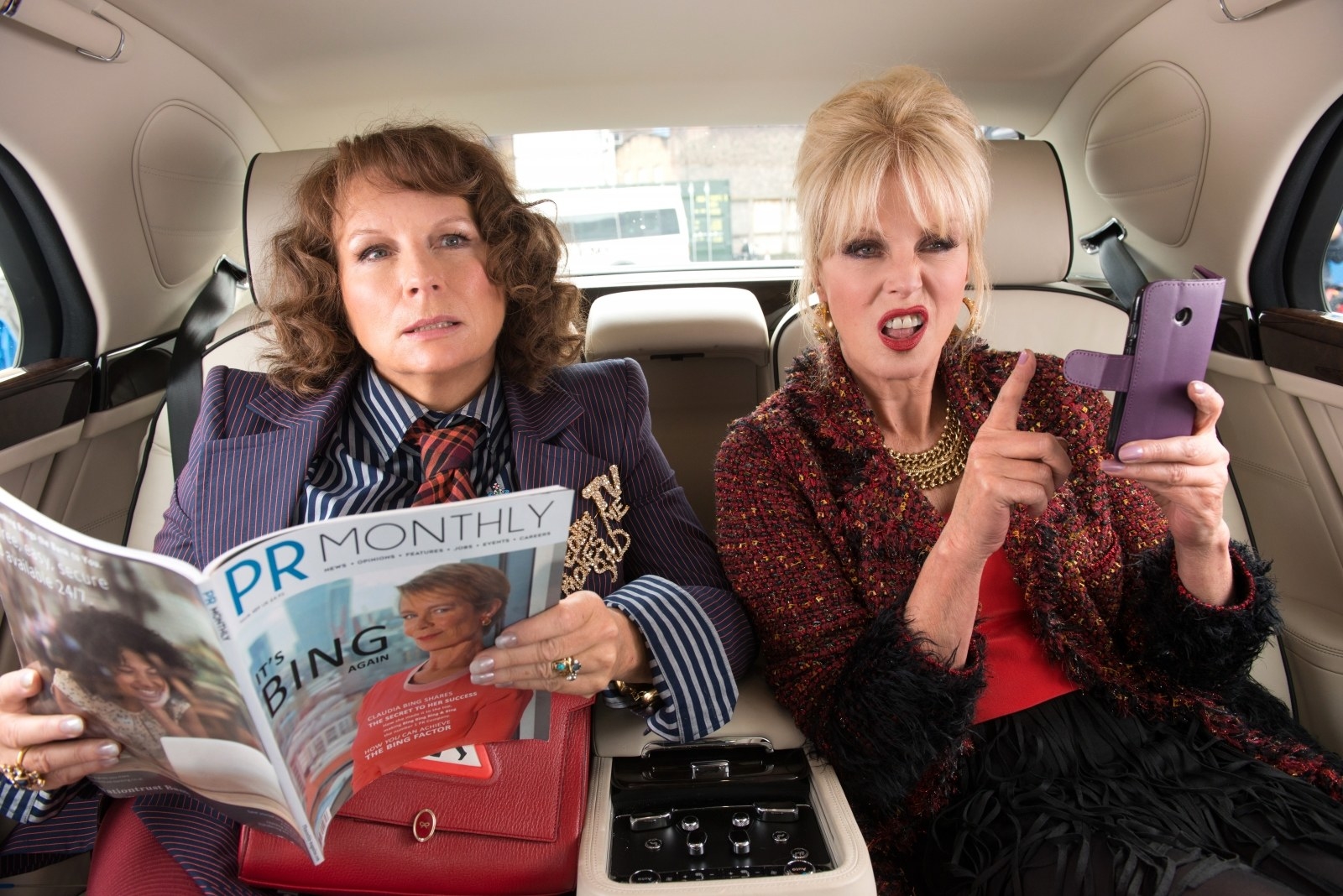
Unlike the characters in Bad Moms, so worried about not living up to a maternal ideal, Edina has always been a genuinely terrible mother to her long-suffering daughter Saffron (Julia Sawalha), now a parent herself to a teenage girl. Edina consistently chooses devil-on-her-shoulder Patsy over her daughter, careening from hangover to elaborate beauty treatment to open bar, clinging fast to a youth that was already well in the rearview when the series began back in 1992. They’re uproarious and monstrous, this co-dependent, self-involved combo, but over the years, their devotion to denying the passage of time and to any sense of age-appropriate behavior has acquired a patina of doomed nobility. Now, they're in their grandmotherly years with no signs of slowing.
Patsy and Edina were always ridiculous, but now they also brandish their own sort of bravery. No one may want to give the pair the spotlight, but they refuse to cede their chance at it. At Cannes, Patsy and Edina go to a party in which the older women stay inside while the men canoodle with younger models on the patio, one of them snarling at the duo that no first wives are allowed outside. It’s an event-sized metaphor for the attention they’re supposed to have long ago relinquished. Patsy and Edina have lived lives of unapologetic, splendid misconduct, and there’s a flicker of the possibility of a comeuppance in the movie, one that thankfully fades away before anything can come of it.
Having gone so long without folding, it would be heartbreaking to see them go down now — their self-indulgent saga should go on forever, propped up by plastic surgery and memoir sales and each other. They’re terrible role models, Patsy and Edina, which is why we need them so badly. Misbehaving can’t and shouldn’t only be defined by men.
